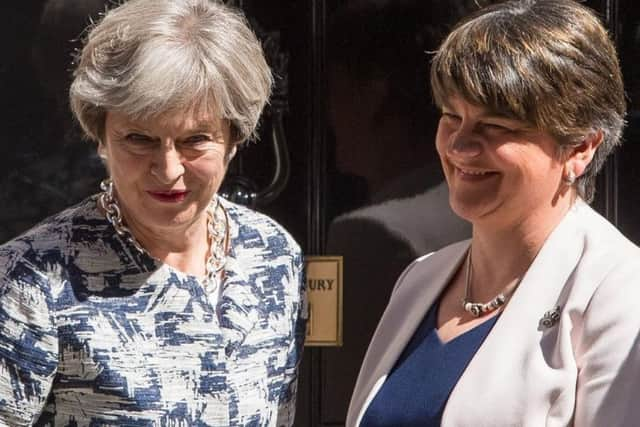Alex Kane: This is a potentially catastrophic moment for the Union
and live on Freeview channel 276
When the Republic ceased to be a member of the Commonwealth the UK government responded with the Ireland Act 1949, which guaranteed that Northern Ireland would not cease to remain a part of the UK ‘without the consent of the Parliament of Northern Ireland’.
A year after that parliament was prorogued the 1973 Northern Ireland Constitution Act declared that, ‘Northern Ireland remains part of Her Majesty’s dominions and of the United Kingdom, and it is hereby affirmed that in no event will Northern Ireland or any part of it cease to be part of Her Majesty’s dominions and of the United Kingdom without the consent of the majority of the people of Northern Ireland voting in a poll held for the purpose...’ Then, 25 years later, the 1998 Northern Ireland Act rejigged the 1973 Act, requiring a referendum only if it ‘appears likely’ to pass, followed by unity negotiations if it does pass.
Advertisement
Hide AdAdvertisement
Hide AdBut what happens if a UK government does something which changes the fundamental nature of the relationship between Northern Ireland and the rest of the United Kingdom? For example, a ‘final deal’ between the UK and the EU which leaves Northern Ireland still in and subject to EU regulations, while the rest of the UK is out. In other words, of what use is the ‘constitutional guarantee’ if Westminster has the power to behave in a way which changes the shape and substance of the Union?


The 1985 Anglo-Irish Agreement did enormous psychological damage to unionism here and dealt a hammer blow to the relationship between unionists and the Conservative party. The unionist parties and electorate believed, rightly I think, that Thatcher had betrayed them. Only a handful of MPs rallied to their side when the agreement was presented to Parliament; and it became very clear that they had very few real friends at the political heart of the United Kingdom. Yet, bad though the Anglo-Irish Agreement was, it did not, in fact, undermine the constitutional integrity of the UK.
But the body language and press statements of the DUP over the past few weeks suggest that the trust they placed in Theresa May will not be rewarded. Last December – a few days after Arlene Foster was forced to issue her first very public threat to the prime minister – I argued that May, if she had the parliamentary arithmetic in her favour, would abandon her agreement with the DUP and push her own deal through the Commons. She was, after all, a Remainer at heart, so why would she jeopardise her preferred deal just to keep the DUP happy? I think the DUP fear she may be now preparing to do just that.
The reality is – and always has been – that their power over the prime minister ends at the precise moment when Mrs May has enough votes from across the Commons to offset the votes of the DUP and her own rebels within the European Reform Group. It boils down to how big a hit the prime minister is prepared to take for her Chequers plan –or something very like that plan: and whether a substantial majority of her own MPs accept that a deal which leaves NI inside the EU doesn’t amount to an existential threat to the United Kingdom.
Advertisement
Hide AdAdvertisement
Hide AdThe DUP would have hoped that the support of their position from heavyweights like Rees-Mogg and Johnson would have weakened the prime minister’s hand; but they failed to land any killer blows on her at the annual conference and it now looks as if she is prepared to stare them down.


Anything can happen in the next few days and weeks: it can’t even be taken for granted that May will survive. But we need to face the fact that this is a potentially very dangerous moment for the Union. Indeed, it has the potential to be a catastrophic moment for the Union. The decisions made by May, her government, the House of Commons and the DUP will define the future of the United Kingdom.
It is too easy, as well as plain wrong, to say that this is all the direct consequence of Brexit. Yes, the referendum result may have stirred the constitutional pot earlier than expected, but the existential question has been in play for some time. The 2014 Scottish referendum resulted in a 45/55 split on independence, with no sign that the question has gone away; the rise of Sinn Fein and the shifting/narrowing demographics in Northern Ireland and the toxicity of the unionist/nationalist relationship had put unity at the centre of debate; the rise of little-England nationalism had raised questions about the relationship between England and the rest of the UK; the rise of nationalist parties across the EU was/is challenging the belief that increasing integration must always lead to increasing harmony and trust; the upturn in immigration into the EU had produced an us-and-them schism; and it is now very clear that millions of people within the EU are more interested in the rights/culture/traditions of their own state than in the bigger idea of ‘EU citizenship.’
Quite where Northern Ireland will be when the dust of the next few months has settled is not entirely clear. It’s not even clear where pan-UK unionism will be when the dust has settled; because, let’s not forget, unionism is more, much more, than Ulster unionism. One thing is certain, though, a deal which pushes Northern Ireland to the window ledge of the United Kingdom would be both stupid and dangerous: as would a hard border. Arlene Foster, Theresa May, the EU and the Irish government must tread very carefully.